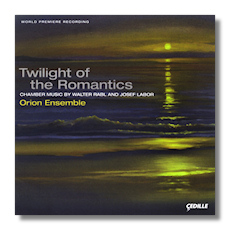
The Internet's Premier Classical Music Source
Related Links
- Latest Reviews
- More Reviews
-
By Composer
-
Collections
DVD & Blu-ray
Books
Concert Reviews
Articles/Interviews
Software
Audio
Search Amazon
Recommended Links
Site News
 CD Review
CD Review
Twilight of the Romantics

- Walter Rabl:
- Quartet in E Flat Major for Clarinet, Violin, Cello & Piano, Op. 1 (1896)
- Josef Labor:
- Quintet in D Major for Clarinet, Violin, Viola, Cello & Piano, Op. 11 (1900)
Orion Ensemble
Cedille Records CDR90000088 DDD 60:47
Summary for the Busy Executive: Romantikerdämmerung.
The CD sports the title "Twilight of the Romantics." Both works were written around the turn of the last century, and both in Vienna, at that. Walter Rabl (1873-1940) stopped composing after the age of thirty, becoming primarily an opera conductor and a pianist. Hard-luck Josef Labor (1842-1924), blind at an early age, couldn't really catch a career break, although he enjoyed the esteem of the highest musical circles in Vienna. Alma Schindler – as she was before she married Mahler – studied with him, and Paul Wittgenstein commissioned him.
Both of these works are at least very good, although it wouldn't surprise you to learn that they might have been composed a generation previously. Rabl's quartet, indeed, won a prize by unanimous vote of a panel that included Brahms. It's extremely well-made. One remarks upon its structural clarity. You need a great deal of talent to mimic Brahms or Schumann – the quartet comes closer to Schumann than to Brahms – even badly. It's a comfortable piece, just the sort of thing amateur chamber players look out for. Unfortunately, the example of Brahms and to some extent the Schumann piano quintet overshadow the work. Brahms, after all, had written his great clarinet works in the same decade as Rabl, and you immediately mark the difference. The Brahms carries, for lack of a better word, heft. It soars above the comfortable, although it has its comfortable moments. The Rabl has almost everything going for it – craft, tuneful charm, poetry – but not the extra bit of inspiration – the music that gobsmacks a listener – which would lift the score to the highest rank.
Far more fascinating and more than charming, the Labor tries more and digs deeper. The older man is also the more progressive composer. There's a little bit of Brahms, particularly at the architectural level, but there's also quite a bit of Liszt and Wagner, without totally succumbing to their ultra-chromatic idiom. In fact, in the sense of uniting chromaticism and classical procedures, Labor reminded me most of Bruckner, a supposition confirmed when I read in the liner notes that Labor studied with Sechter, Bruckner's teacher. To me, Labor succeeds far better than Bruckner in melding classical structural principles with 19th-century chromaticism, although his tone is a far cry from Bruckner's religious yearning, and, in this score at least, he's not scaling mountaintops.
The work – officially in four movements, functionally in three – begins with a sonata allegro, full of complex thematic relationships, but without thorns. Labor sounds as if he's "just singing." The second movement, an allegretto, blurs the line in an intriguing way between variation and fantasia on a single idea. Vaughan Williams does the same thing on a larger scale in his 5 Variants on Dives and Lazarus. The third movement, titled "Fantasia," really functions as a prelude to the finale, a more formal variation set. Throughout the quintet, Labor weaves thematic relationships among movements. For example, the final notes of the violin in the "Fantasia" are the first theme of the entire work. It flits by, almost beyond the listener's sonar, but if caught, it prepares you for a wonderful surprise in the finale.
The Orion Ensemble (Jennifer Marias, viola; Kathryne Pirtle, clarinet; Florentina Ramniceanu, violin; Diana Schmück, piano; Judy Stone, cello) gets these pieces. It understands the High Romanticism of both works, as well as the considerable intellect that went into their creation. Furthermore, they don't subject either score to a "one-size-fits-all" routine. They take into account the character of both works. Accordingly, the Rabl sounds bright and cheery, the Labor mellow and autumnal. For sheer pleasure, this disc is hard to beat.
Copyright © 2007, Steve Schwartz.




















